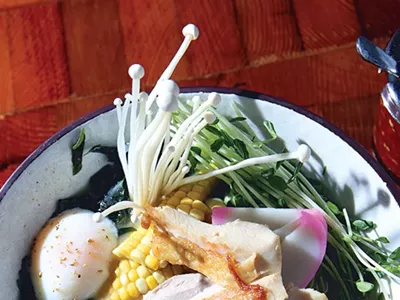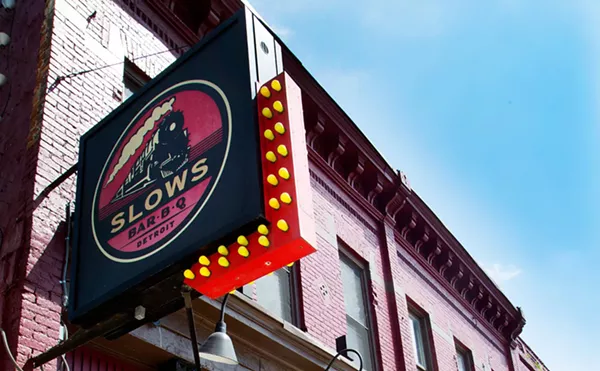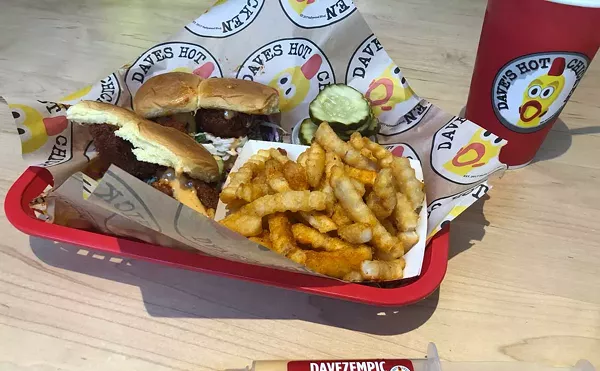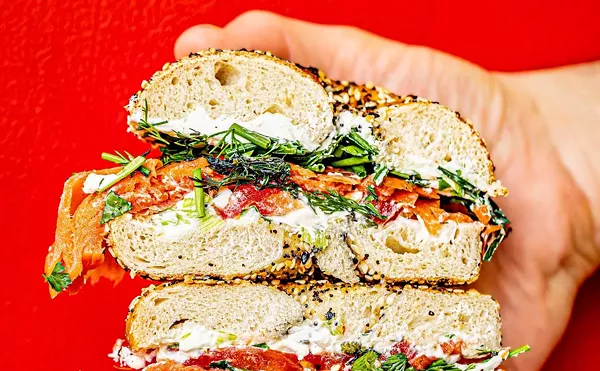Believe it or not, there was a time when people enjoyed drinking vinegar. And it wasn't so long ago either.
It's a story that twists back through the last several centuries, but it's simpler to say that, in Colonial-era America, vinegar was a component in that day's refreshing drinks. Why? Because of its preservative qualities. That's how vinegar syrups (called "shrubs") wound up in punches and, yes, alcoholic drinks of the day. And vinegar had a good long run as a beverage ingredient — at least until the age of affordable electric refrigeration. Preserving flavor became a simple matter of chilling things, and vinegar became something you put in your salad instead.
These days, there's a local company aiming to bring back those tart tastes of yesteryear, and it's called McClary Bros. Handcrafted Drinking Vinegars. It's the brainchild of husband-and-wife team Josh and Jess McClary. Since May of last year, they've focused on building their "old-timey" vinegar company, and they've met with surprising success. In a year-and-a-half, they've gone from a small cottage operation to being carried by a major local distributor. We met with Jess McClary at the company's "tasting room" (a booth, really) at Rust Belt Market last week, along with their mixologist, Rudy Leon, the bartender-elect at Detroit's soon-to-be-opened Selden Standard.
Metro Times: Did people really drink vinegar once upon a time?
Jess McClary: I think, for a long time, they didn't because refrigeration came along. But they were more interesting. It's fun to play with something new. Our drinking vinegars are shrubs, which is a Colonial-era cocktail and soda mixer, so they're made in that style. We don't heat anything; nothing's cooked, so all of the flavors are as vibrant as possible. The mother isn't destroyed in the process because it's not pasteurized, so the flavors will continue to develop in the bottle like a bottle of wine. We suggest that people try the vinegars when they first buy them and they're young and newly bottled, and then again three or four months later when they've had a chance to really develop.
MT: So vinegars age like wine?
McClary: Ours do.
MT: What do you mean by "the mother?"
McClary: The mother is a component of all vinegars that is this cloudy, murky thing inside that turns it to vinegar. But when you pasteurize vinegar, like the stuff you buy in the grocery store, all of that is no longer living. It's just vinegar for the cleaning or cooking properties of vinegar. It's like pasteurized juice versus raw juice.
MT: This stuff is alive?
McClary: It still has the mother in it, so you find it to continue to develop. It's not like it's going to grow an arm and come out at you! [laughs] For people that are going to drink it really fast, you can leave it out at room temperature. But, if you are going to let it ripen and you want it to reach that point where the flavor changes — and if you're a person that drinks a lot of kombucha — then go ahead and leave it out, because you're already drinking something like Kombucha that has a lot of that material in it, so it's not off-putting to you. These things that develop in there, they look a little odd. There's nothing wrong with them. In fact, there are a lot of beneficial properties to things like that, though they can look odd.
MT: Is this connected to the probiotic, body pH kind of thing?
McClary: There are a lot of people who drink organic, unpasteurized apple cider vinegar, like a shot in the morning for the health benefits, and we don't specifically say, "Use this instead of that," because this isn't that alone. That's the type of vinegar we use, and it's the base for all of our vinegars, but we use organic cane sugar to extract the juice and there's juice from the fruits and vegetables. So, it's not only vinegar, so it wouldn't be the same dilution. It's really more like between 80 and 85 percent vinegar. The rest is the juice and the other things that are present, so it's not an even swap, but it's the same quality of vinegar that you might be used to if that's what you were already doing.
MT: It seems like a missing piece of culinary history. I had never heard of this until you started announcing that you were making drinking vinegar. Would, like, President Grover Cleveland get up in the morning and have some vinegar?
McClary: Vinegar was used for a lot more than it is today. It was a great preservative; that's why so many things were pickled. It doesn't require refrigeration, and things lasted a really long time. It was a home remedy that people always kind of relied upon. It was also meant to mask the really terrible flavors in distilled spirits in the 1700s. A lot of byproduct was in there, so they were hard to digest. The vinegar aided that, and masked the awful way spirits smelled and tasted back then. Of course, the spirits are much more finely distilled now.
We like to say that ours is like a modern take on the traditional concept, because the purpose back then was you were preserving fruit and that was really important obviously, because you weren't going to have fruit in the wintertime. The flavors that we do are that same technique, but you never would've seen a beet and carrot shrub, because beets and carrots would actually store in the winter. Thai basil is an amazing flavor that we do, but why would you have ever made that into a vinegar?
MT: So your vinegars are inspired by that tradition.
McClary: Some of them are spot-on in what you would see, like cherry, for example. You definitely would've found something like cherry. We do a blood orange, and orange was really popular, I think, because oranges were a lot harder to come by. So when you got them, you really wanted to make them count — kind of stretch them. We kind of take that concept a step further.
MT: Do you distribute, or do people pretty much buy from you wholesale?
McClary: We've been distributed now for about eight weeks through Veritas. Before that, we were sold in about 60 places; now it's almost 100. — mt
McClary's can be reached at mcclarybros.com
Drink Recipe - "The bro toddy"1/4 ounce honey for sweetness (or more if you'd like)
1-1/2 ounce of any kind of bourbon, rye, or whiskey.
3/4 Falernum Liqueur
1 ounce of McClary's Apple Pie Shrub
1/2 ounce of lemon juice, freshly squeezed
Hot water
Cinnamon stick
Fresh lemon peel
Add the honey, then the hot water. Stir to break up the honey on the bottom and dissolve it a bit. Add the other ingredients. Stir. Garnish with a cinnamon stick wrapped in lemon peel.






